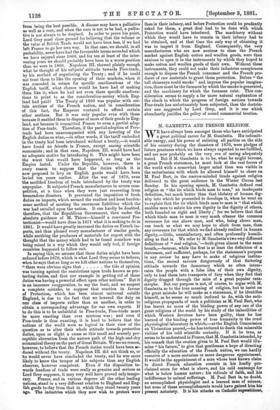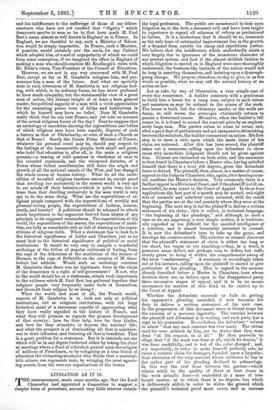M. GAMBETTA AND FRENCH RELIGION.
WE have always been amongst those who have anticipated a great political career for M. Gambetta. His indomit- able energy, and his power of enlisting all parties on the side of his country during the disasters of 1870, were pledges of future greatness which we have always expected to see fulfilled, and are now probably on the very eve of seeing adequately tested. But if M. Gambetta is to be, what he might become, a great French statesman, he must look at the real forces of the world with a somewhat larger mind than was visible in the sectarianism with which he allowed himself to cheer on M. Paul Bert, in the narrow-minded tirade against religion delivered to the great audience in the Winter Circus last Sunday. In his opening speech, M. Gambetta defined real religion as "the tie which binds man to man," an inadequate definition, but much better than that idolatry of human dig- nity into which he proceeded to develope it, when he went on to explain that the tie which binds man to man is "that which enables man to salute his own dignity in the dignity of others, both founded on right and liberty ;" for we believe that that which binds man to man is very much oftener the common reverence for one above man, and who, being above man, can teach us what we may hope to elicit from man, than any reverence for that which we find already realised in human dignity,—little, unsatisfactory, and often profoundly humili- ating as that is. We refer to M. Gambetta's two very different definitions of "real religion,"—both given almost in the same breath,—because, while the first is at least the definition of a statesman, and sufficient, perhaps, for the statesman's purpose in any review he may have to make of religious institu- tions, the second savours dangerously of that flattering attitude towards the democracy which so often intoxi- cates the people with a false idea of their own dignity, only to lead them into transports of fury when they find that dignity dragged through the mire of a great popular cata- strophe. But our purpose is not, of course, to argue with M. Gambetta as to the true meaning of religion, but to insist on the great mistake he will make as a statesman, if he identifies himself, as he seems so much inclined to do, with the anti- religious propaganda of such a politician as M. Paul Bert, who has learnt no more of the binding power of any one of the great religions of the world by his study of the imbecilities of which Western devotees have been guilty, than he has learned of the binding power of true humanity in the cruel physiological laboratory in which,—as the English Commission on Vivisection proved,—he has tortured to death the miserable victims of his cold scientific curiosity. If it be true, as seems to be understood in France, that M. Gambetta intended, by his remark that the ovation given to M. Paul Bert would illu- mine "his future," to give that gentleman a hope of directing officially the education of the French nation, we can hardly conceive of a more sectarian or more dangerous appointment. It would be the appointment of a man whose best known claim to direct French education consists in his loudly pro- claimed scorn for what is above, and his cold contempt for what is below human nature ; his ridicule of faith, and his indifference to animal sufferings. M. Paul Bert is, no doubt, an accomplished physiologist and a learned man of science, but none of these accomplishments would have gained him his present notoriety. It is his attacks on Oatholio aupetatitiona,
and his indifference to the sufferings of those of our fellow- creatures who have not yet reached that " dignity " which democrats ascribe to man as he is, that have made M. Paul Bert's name almost as well known in England as in France. In England, we are thankful to say, such a Minister of Educa- tion would be simply impossible. In France, such a Minister, if possible, would certainly sow the seeds, for any Cabinet which adopted him, of a sort of unpopularity of which we could form some conception, if we imagined the effect in England of making a man who should combine Mr. Bra.dlaugh's views with Dr. Klein's views, Vice-President of the Council of Education.
However, we are not in any way concerned with M. Paul Bert, except so far as M. Gambetta eulogises him, and pro- nounces him a man of the future. And what we specially miss in such utterances of M. Gambetta is not religious feel- ing, with which, in its ordinary forms, he has never professed to have much sympathy, but the statesmanlike view of a great man of action, the literary insight of at least a keen general reader, the political sagacity of a man with a vivid appreciation for the cementing power even of faiths and institutions in which he himself may have no belief. Does M. Gambetta really think that he can rule France, and yet take no account of the actual religious forces of the day? Does he suppose that an anthology of anecdotes showing the superstitions and follies of which religious men have been capable, disposes of such a history as that of Christianity, or even of such a Church as that of Rome? Surely the future Prime Minister of France, whatever his personal creed may be, should pay respect to the feelings of the innumerable people, both small and great, who hold that education is, after all, in the main a religious process,—a taming of wild passions in obedience at once to the revealed commands, and the whispered dictates, of a Power whose fullest manifestation still dates the origin and growth of all the national annals of the West, and has changed the whole course of human history. What do all the imbe- cilities of so-called religious teachers amount to, except proof that dwelling too exclusively in the unseen world is very apt to set minds off their balance,—which is quite true, but no truer than that dwelling exclusively in the seen world is very apt to do the same thing. What are the superstitions of re- ligious people compared with the superstitions of worldly and pleasure-loving people, the superstitions of fashion, honour, youth, and beauty? A politician should be ashamed to attach much importance to the argument derived from abuses of any principle to its supposed unsoundness. The superstitions of the world, the superstitions of the senses, the superstitions of ambi- tion, are fully as remarkable and as full of warning as the super- stitions of religious faith. What a statesman has to look to is the historical significance of faiths and Churches, just as be must look to the historical significance of political or social institutions. It would be very easy to compile a wonderful anthology of the follies of popular outbursts of feeling, from the rage of the Athenians at the mutilation of the statues of Hermes, to the rage of Belleville on the occasion of M. Gam- betta's last address. Would such an anthology convince M. Gambetta that there was no legitimate force in the claim of the democracy to a right of self-government? If not, why in the world should he, as a statesman, attach such importance to the evidence which M. Paul Bert has gathered together that religious people very frequently make fools of themselves, and discredit their religion by so doing What the world, and most of all, the French world, expects of M. Gambetta is to look not only at political institutions, but at religious institutions, with the large historical mind of a statesman capable of appreciating what they have really signified in the history of France, and what they still promise as regards the present development of that country ; how far they help, how far they hinder, and how far they stimulate or depress the national life; and what the prospect is of diminishing all that is mischiev- ous in their influence, and fostering all that is beneficial. That is a great problem for a statesman. But it is certainly not one which will be in any degree furthered either by taking the chair at meetings where a flood of ridicule is poured upon the religion • of millions of Frenchmen, or by eulogising as a true friend of education the vivisecting secularist who thinks that a material- istic science can regenerate man, by wringing the most agonis- ing secrets from the nervous organisations of the brutes.



































 Previous page
Previous page